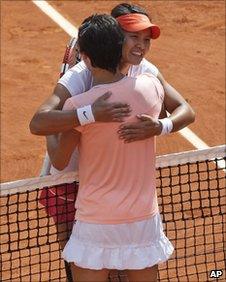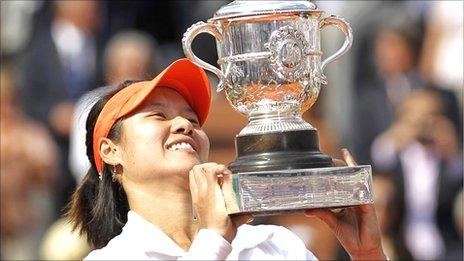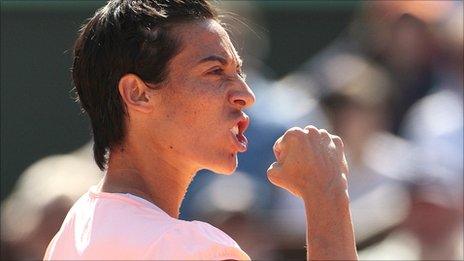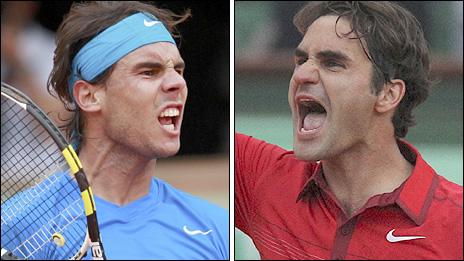French Open: China's Li Na seals historic win over Schiavone
- Published
Li Na sweeps to victory over Francesca Schiavone
Li Na made history as the first Chinese player to win a Grand Slam singles title with a straight-sets win over defending champion Francesca Schiavone in the French Open final.
The 29-year-old, ranked seventh in the world, made up for defeat in January's Australian Open final by beating the Italian fifth seed 6-4 7-6 (7-0).
Dominant on serve and consistently threatening from the baseline, Li overcame a late wobble to take away Schiavone's title in one hour and 48 minutes.
"When I was a young player I wanted to be in a Grand Slam final," said Li. "But today, some people say I'm getting old - so the old woman had the dream come true. Not easy."
The pair had met four times previously, with two wins apiece and Schiavone winning the last on her way to the title at Roland Garros last year, making her the slight favourite in many people's eyes.
Li had never been a fan of clay in the past, whereas Schiavone's heavy topspin, vicious kick serve and sweeping single-handed backhand, has proved perfect for moving opponents out of position on the red dirt.
That was the theory; in practice the match set off on a different path and only rarely deviated.
Li's cross-court forehand, which would prove a key shot, earned her a break point in the opening game that went begging, before doing the job in game five for a 3-2 lead.
The Chinese player then went on to close out the set magnificently, getting to set point with another of those forehands, this time played while edging backwards under pressure, and after 39 minutes she had dropped just six points on serve.
With the predicted showers not on the horizon on a muggy Paris afternoon, Schiavone would have to dig herself out of this hole, but she was losing the baseline battle and failing to mix up the pattern of play with enough drop shots and dashes to the net.
The Italian pulled a forehand down into the net to give up a break at the start of the second set and, after playing a beauty of a drop volley to earn a break-back point in the next game, could only stand and watch as a Li ace whistled down the centre line.
Li had lost to Kim Clijsters in the final set in Melbourne, and Schiavone's best hope appeared to be an attack of nerves from the sixth seed if she could prolong the contest.

Emotional scenes as Schiavone congratulates her Chinese conqueror
There were signs of that happening as two more break points came and went for Li, the first an inviting mid-court forehand smashed into the net, and game eight finally saw the cracks begin to appear as four forehand errors brought Schiavone level at 4-4.
With her confidence returning, the champion was suddenly dictating matters and looked the more likely in the closing stages of the set, but she was upset by a line call at 6-5 and failed to win another point as Li played the tie-break superbly.
She opened with a dart to the net of her own and an angle forehand volley, a fabulous high backhand drive-volley put her 4-0 up, and Schiavone then netted a volley and sent one long to trail 6-0.
Victory was now assured and the only moment of doubt remaining came when, preparing to serve, a Chinese shout from the crowd disturbed Li and she had to compose herself. The mind was clear enough, however, and when Schiavone fired over the baseline tennis had a new champion, and a new nation on the Grand Slam roll of honour.
"She played a really high level through one set and 2-1, 3-1, she was playing really well," said Schiavone.
"I think at the end we were really close and it could be the set for me or for her. But at the end, she won. I think she deserved this final."
And asked about the line call at the end of the second set, she added: "One ball can't make so much difference, but in the moment you have to check really good the ball. That's what I contest."
- Published4 June 2011

- Published2 June 2011

- Published4 June 2011

- Published8 November 2016
